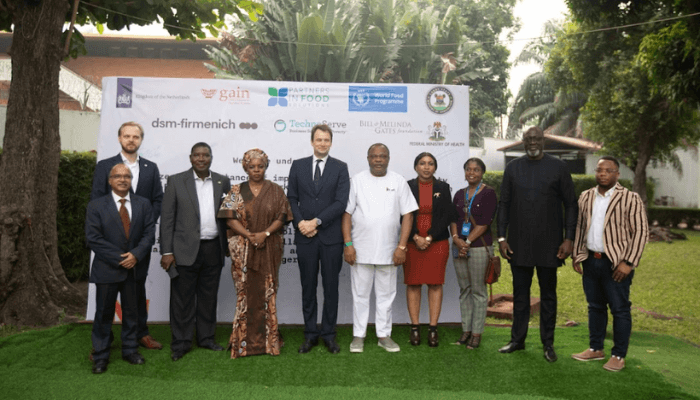Rice fortification seen as solution to Nigeria’s malnutrition problem – Expert
Large-scale rice fortification has been seen as an effective solution in tackling Nigeria’s accelerating malnutrition problem, experts say.
The experts who spoke at a stakeholder’s event held recently by the Netherlands Embassy in Lagos state, said rice fortification will positively impact micronutrient deficiencies in the country.
Geoffrey Van Leeuwen, Minister for Trade and Development of the Kingdom of The Netherlands, at the stakeholders’ event, emphasized the significance of fortified rice as a crucial element in the national strategy to combat micronutrient deficiencies.
He said, “We applaud Nigeria for its significant strides in addressing nutritional concerns. The integration of fortified rice is a pivotal component within the country’s nutritional strategy to combat micronutrient deficiency.”
“Rice fortification is a key area of expertise for DSM-Firmenich who are collaborating and supporting government, NGO and businesses in their initiatives to scale up rice fortification in Nigeria,” he said.
The collaborative effort between the Netherlands Consulate General and DSM-Firmenich underscores a commitment to promoting nutrition and addressing critical health challenges in Nigeria through the Rice Fortification Roadmap 2026.
Tella Ayodele Elizabeth, senior program manager at TechnoServe, an advantage element for the fortification of this particular staple food category is that the rice sector is “highly organized. You have the big mills (about 60-65 of them) as RIPAN. You have the medium scale as RIMAN.”
According to John Uruakpa, director of the Federal Ministry of Health, Nigeria said, “Over 90 percent of families consume rice. Whether you’re poor or wealthy, you consume rice.”
“The rice fortification agenda is going to be a very good vehicle to make sure you have nutritious rice on your table.”
Uruakpa in rolling out the fortification plan, during his keynote speech, said it is no longer news, the prevalence of malnutrition is very high in Nigeria, especially micronutrient deficiency.
“Nigeria is second to Pakistan in terms of malnutrition in the world. And part of what the government is doing about it is fortification of some of our foods, as well as supplementation.
“On fortification, Nigeria has for the past two decades been in business, ensuring that some of our foods are mandatorily fortified. And some of these foods include flour, oil, sugar, and salt, and some are even double-fortified.”
However, the goals and objectives of this fortification have not been achieved. The NDHS Survey of 2018 indicates that these micronutrient deficiencies persist, especially anaemia in pregnancy.
“After this survey, the government found that fortified foods do not reach rural/hard-to-reach areas, and when they do, are unaffordable. Rice was selected now because it is the most consumed staple,” Uruakpa said.
Abisola Olusanya, commissioner for Agriculture, Lagos State, has said that fortification is the way to go considering the level of micronutrient deficiency in Nigeria.
“I know that the federal government is also willing and wanting to take nutrition to the next level, especially with what we have prevalent in our little children. I hope the discussion is taken forward till we see a true manifestation in the products that we have in our country,” she said.
According to the 2023 Cadre Report, malnutrition has remained a major issue in Nigeria, affecting over 35 million children under age five, with 12 million stunted, three million wasted, and 23.5 million anaemic. 17.7 million hungry people, with a million suffering from acute food insecurity.
The World Health Organisation classifies Nigeria as having a high burden of both stunting and wasting. UNICEF estimates that two million children in Nigeria suffer from severe acute malnutrition.
Business Day / Foluke Ibitomi


Comments are closed.